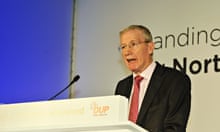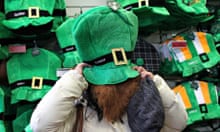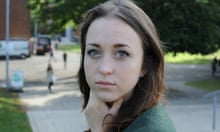There is something absurd and rather tragic about setting out on a journey around a country, knowing that if you speak the language of that country you will not be understood. It is even more absurd when the country is your native one and you are speaking its native language.
Irish (Gaelic) is the first official language of Ireland. We have been speaking it for 2,500 years, right up until the British decided it would be easier to govern us if we spoke their language (and then outlawed the use of Gaelic in schools) in the 19th century. We, in turn, soon realised that our only hope of advancement was through English, and we - or at least the half of the population that survived the Famine - jettisoned Irish in a matter of decades. Had it not been for the Celtic Revival that accompanied Ireland's fi ght for independence in the early 20th century, the language would have probably died out by now. Today, a quarter of the population claim they speak it regularly. I have always suspected this figure and to test its accuracy I decided to travel around the country speaking only Irish to see how I would get on.
I chose Dublin as a starting point, confident in the knowledge that in a city of 1.2 million people I was bound to find at least a few Irish speakers. I went first to the Ordnance Survey Office to get a map of the country. (As a semi-state organisation it has a duty to provide certain services in Irish.) "Would you speak English maybe?" the sales assistant said to me. I replied in Irish. "Would you speak English?!" he repeated impatiently. I tried explaining once again what I was looking for. "Do you speak English?" he asked in a cold, threatening tone. "Sea," I said, nodding meekly. "Well, can you speak English to me now?" I told him as simply as I could that I was trying to get by with Irish.
"I'm not talking to you any more," he said. "Go away."
I really needed a map for the journey ahead; it would be hard enough to get by without having to ask for directions constantly. I tried addressing the man one last time, using the simplest schoolroom Irish that he must have learned during the 10 years of compulsory Irish that every schoolchild undergoes, but he covered his ears, and I was left with no choice but to leave.
It was not a good start. Although it was still early I decided I needed a drink and headed to an elegant Victorian bar off Grafton Street. "I don't speak Irish mate, sorry," replied the barman when I ordered a pint. I tried simplifying the order - although how much simpler can you make, "I'd like a drink, please"? "I don't speak Irish mate," he said again. I have managed to get drinks in bars from Cameroon to Kazakhstan without any problem; if I had been speaking any other language I doubt it would have been an issue. I tried pointing at what I wanted - the taps were lined up along the bar - but I made the mistake of talking as I pointed.
"Did you not hear me, no?" the barman said menacingly.
I thought it safer to get one of the customers to translate for me, but they stared resolutely into their pints when I turned to them. Eventually, one young lad, taking pity on me, advised me to go to a cafe on Kildare Street.
"A cafe?" I said. "I'm looking for a drink." "Just go there," he said, and so, following his directions I found myself in a murky cellar beneath the offices of the Irish language development agency. They had no beer licence, but I got a cup of coffee and the owner told me in rich, mellifluous Irish how the place was normally teeming with Gaeilgeoirí (Irish speakers) but because it was a sunny day no one wanted to be skulking underground and so I was the only customer. The city's Victorian plumbing was struggling to cope with the July heat and the place stank of sewage. I could not help thinking it was a sort of ghetto, a sanctuary for a beleaguered minority.
I knew the journey was going to prove difficult, just not this difficult. Language experts claim that the figure of fluent Irish speakers is closer to 3% than the aspirational 25% who tick the language box on the census, and most of these are concentrated on the western seaboard, in remote, inaccessible areas where one would not naturally find oneself. What I had not factored for was the animosity. Part of it, I felt, stemmed from guilt - we feel inadequate that we cannot speak our own language.
I decided to contact a talk radio show in Dublin to ask the listeners what they thought. A few phoned to say that they had no idea what I was talking about. "Is the language dead? I asked in Irish, over and over again. "Sorry?" most of them replied, or: "You what? Are you speaking the Irish?" Some of the callers wanted me and my bog language pulled off the airwaves, others talked of their shame at not being able to understand me and of how much they admired me for speaking out. This in turn made me feel guilty: the only reason I speak Irish is because my grandmother went to the trouble of learning it 90 years ago as a weapon in the struggle for an Irish republic. She then bribed me as a child with sweets and treats to go on speaking it when I realised that none of my friends did. In fact, I had almost discarded it, regarding it as a dead weight around my neck, until TG4, the Irish-language television station, was set up in 1996 and I started making travel documentaries for it.
After the radio show, I decided to visit the tourist office which, presumably, was used to dealing with different languages. The man at the counter looked at me quizzically when I inquired about a city tour. "Huh?" he said, his eyes widening. I repeated myself. "You don't speak English, do you?" he asked coldly. I was beginning to hate this moment - the point at which the fear and frustration spread across their faces. They were just trying to get through the day, after all. They did not need to be confronted by an unbending foot soldier of the Irish Taliban.
I explained what I was trying to do. "Well, mate, I don't actually speak Irish, so ... " he paused menacingly and I tried to smile encouragingly, "so, If you speak English, I'll be able to understand what you're saying."
"Béarla only - English only," said his supervisor, standing sternly behind him, repeating it a second time in case I was slow. I asked if there was any other language I could use and they pointed to a list of seven flags on the wall. To be honest, I could speak five of them but I had promised myself not to, not unless it was absolutely necessary. Eventually they located a charming young woman who spoke perfect Irish and was able to tell me everything I needed to know, but she was terribly nervous, believing her vocabulary to be inadequate. It was not; it was wonderful. It is an odd tendency that people often have an erroneous view of their ability to speak Irish, either over- or underestimating their ability - possibly a convoluted psychological legacy of the stigma attached from days when it was a sign of poverty and backwardness.
I might have been tempted to give up the journey entirely had it not been for something that happened during the radio phone-in. I was rapidly approaching a point of despair when some children came on the line. I found they spoke clear and fluent Irish in a new and modern urban dialect. They told me how they spoke the language all the time, as did all their friends. They loved it, and they were outraged that I could suggest it was dead. These were the children of the new Gaelscoileanna - the all-Irish schools that are springing up throughout the country in increasing numbers every year. While old schools are being closed down or struggling to find pupils, the Gaelscoileanna are having to turn people away. The phenomenon is as popular among the affluent middle classes as it is in working-class estates, largely due to the excellence of the education: Irish-speaking secondary schools often score higher in state exams than the most elite fee-paying schools. The students come away unburdened with the sense of inferiority that every previous generation had been instilled with since the days in which the British first labelled Irish as backward.
These children were reared on Irish versions of SpongeBob SquarePants and Scooby-Doo on TG4 . They had invented Irish words for X-Box and hip-hop, for Jackass and blog. They were fluent in Irish text-speak and had moulded the ancient pronunciations and syntax in accordance with the latest styles of Buffy-speak and Londonstani slang. I realised it was they I should have turned to for help on the streets. The children filled me with renewed confidence as I left Dublin and took to the road, boosted further by my first experience in a petrol station where a Polish attendant had no problem deciphering the complicated mechanical query I had about my borrowed vintage Jaguar. For him, every day involved a struggle to understand a foreign language, and whether I was speaking Irish or English made little difference. In fact, everyone I met over the course of the next 1,000 miles driving around the country were more approachable and considerate than those first few Dubliners. Not that I am claiming they all had fluent Irish - far from it - but they were willing to engage with me, to string together the few stray words of school Irish that arose from the darkest recesses of their minds, or else to try to decipher my miming and mad gesticulation.
None the less, the journey was still a strain for most of the time. I got given the wrong directions, and served the wrong food, and given the wrong haircut, but I was rarely threatened or made to feel foolish again. Even on the staunchly loyalist Shankill Road in Belfast I was treated with civility, though warned that if I persisted in speaking the language I was liable to end up in hospital. In Galway, I went out busking on the streets, singing the filthiest, most debauched lyrics I could think of to see if anyone would understand. No one did - old women smiled, tapping their feet merrily, as I serenaded them with filth. In Killarney, I stood outside a bank promising passers-by huge sums of money if they helped me rob it, but again no one understood.
I know that by the end of the trip I should have reached some conclusion, but in fact I was more confused than ever. In parts of Northern Ireland, where Irish was effectively banned until the early 1990s, I found a tremendous resurgence taking place. The Good Friday agreement recognised its status and now the North has its own daily Irish-language newspaper, a daily BBC Radio programme and a brand new local radio station. In Galway, I met Irishspeaking immigrants who have formed a lobby group to promote the language. I met publishers who are churning out ever more Irish novels, biographies and poetry each year.
From a purely regulatory perspective, the language has recently won some important (though possibly Pyrrhic) victories - the Official Languages Act guarantees the right to communicate in Irish with all state and semi-state organisations (although whenever I tried sending Irish emails to government bodies during the journey they were ignored).
Possibly the language's most significant moment of the past few centuries occurred on Monday this week when Irish became an official working language of the EU. It is a huge vote of confidence by our European neighbours, and it seems appropriate that Irish people should decide at this time once and for all what we want to do with our mother tongue. Should we stick a do-not-resuscitate sign around its neck and unplug the machine, or else get over our silly inferiority complex and start using the bloody thing?
As the Gaelscoileanna children might say: "Athbhreith agus cuir diot é!" (Just rebirth and get over it!).
· The TV series based on Manchán's journey, No Béarla, begins on Sunday at 9.30pm on TG4.
Know your Gaelic: A brief guide
Yes Sea
No Ni hea
Hello Dia Duit
Goodbye Slán
English Béarla
Irish Gaeilge
He's a total schmuck Is gamal ceart é!
What an old rust bucket! A leithéid do gliogramáin meirgeach!
Incense Bata túise
Lipstick Béaldath
Shut your mouth! Dún do chlab!
Crazed Guardian readers Lucht baoth léite an Ghuardian
Night of boozing Oíche diúgaireachta Drunk Ar meisce Moronic Uascánta
Can you recommend a hotel, darling? An féidir óstán a mholadh dom, a thaisce?
Can you direct me to a sympathetic priest? An féidir leat mé a dhíriú i dtreo sagart tuiscineach?


